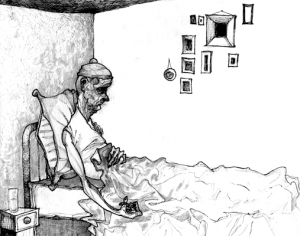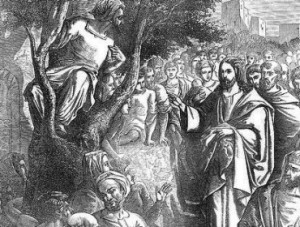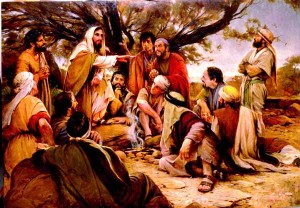====================
This sermon was preached on Sunday, December 9, 2012, at St. Paul’s Episcopal Church, Medina, Ohio, where Fr. Funston is rector.
(Revised Common Lectionary, Advent 2, Year C: Baruch 5:1-9; Canticle 16 (The Song of Zechariah, Benedictus Dominus Deus, Luke 1: 68-79); Philippians 1:3-11; and Luke 3:1-6. These lessons can be read at The Lectionary Page.)
====================

What is the crying at Jordan?
Who hears, O God, the prophecy?
Dark is the season, dark our hearts
and shut to mystery.Who then shall stir in this darkness,
prepare for joy in the winter night?
Mortal, in darkness we lie down, blindhearted,
seeing no light.Lord, give us grace to awake us,
to see the branch that begins to bloom;
in great humility is hid all heaven
in a little room.Now comes the day of salvation,
in joy and terror the Word is born!
God comes as gift into our lives;
oh let salvation dawn!(Words: Carol Christopher Drake)
What is the crying at Jordan? What is the crying in New York? What is the crying at Arlington? What is the crying in Southern California? What is the crying at Checkpoint 18 outside of Kabul? What is the crying in Medina? What is that crying?
“Take off the garment of your sorrow and affliction,” wrote Baruch, “and put on forever the beauty of the glory from God.” This is a time and a season when we expect to leave behind our sorrows and our afflictions; we expect to feel happiness and joy, and if we don’t we feel guilty because that’s what your supposed to feel at Christmas, right? But the truth is that for many this is a time and a season when sorrow and affliction are felt most acutely. That crying is the voice of those feeling the cold hand of death and the emptiness of loss in this season of joy and celebration.
This is a time and a season when death and loss can and do really hit home. Nine days ago, a week ago Friday, we received word that Nancy Lawrence, a long-time, life-time member of this congregation had passed away. Even though her last several months of life were, frankly, awful and everyone who has known Nancy is relieved that she is no longer suffering, still any death is an occasion of sadness. For many this is a time and a season when sorrow and affliction are felt most acutely.
This past Friday, day before yesterday, I got word in the evening that Deborah Griffin Bly, a woman I’ve known and whose music I have enjoyed for seventeen years had died. She was one of the singing duet called “The Miserable Offenders” and it was she and her partner who introduced me to that exquisite piece of poetry and its musical setting, Hymn 69, in our hymnal. Deb and I were part of community of Anglicans online that extends around the world; through it we have had nearly a thousand mutual friends. For many this is a time and a season when sorrow and affliction are felt most acutely.
Thirteen years ago, on the longest night of the year, the winter solstice, December 21, my mother passed away. Losing a parent is one of life’s hardest lessons, and never a good prelude to Christmas, and every year after the joyous holiday is also a reminder of the most profound loss. For me, as for many, this is a time and a season when sorrow and affliction are felt most acutely.
And, yet, Baruch writes, “Take off the garment of your sorrow and affliction, and put on forever the beauty of the glory from God.”
In the current issue of the magazine The Christian Century, Lutheran pastor Peter Marty tells of preaching a Christmas Eve sermon in which he made “reference to a little boy in a rough section of Trenton, New Jersey, whose body was found stuffed in a bag under a fire escape.” At the conclusion of the service a woman “told [him] in the receiving line that mention of children being murdered had no place in a Christmas sermon. [She said,] ‘I will never set foot in this church again.'” (December 12, 2012, Vol. 129, No. 25, page 10) I don’t know if I would mention a murder in a Christmas sermon, but I think we all need to remember that for many this time of year is not a “holly, jolly” season.
As we get ready for whatever good times we anticipate, as we prepare to celebrate the Messiah’s birth, let’s remember that unless we see the shadow of the cross falling on the crib we are not seeing Christmas clearly. Jesus did not enter this world just to be a cute little baby; he grew up! He lived in a time of political turmoil in a land oppressed by the military might of the Roman Empire. He taught a subversive “good news” that offended both that Empire and the religious establishment of his own country which sought to appease it. His truth would lead to his arrest and he would suffer and die on a cross. That he did so and rose from the dead so that our sins might be forgiven and we might enter into the Kingdom of God is why Christmas is special. Christmas Eve might not be the time or place to make mention of the murder of children, but our time of preparing to appreciate Christmas is a time to appreciate the reality of death and suffering, the reality of sorrow and affliction.
Traditionally, on this Second Sunday of Advent (and again next week on the Third Sunday) we focus our attention on John the Baptist, the forerunner who was the voice crying in the wilderness. His was the voice crying at Jordan, “In the desert, make straight a pathway for our God.” We turned our attention toward John this morning by saying together the words of the song his father, the priest Zechariah, sang at his birth. It’s a great canticle, and I love its final words:
In the tender compassion of our God
the dawn from on high shall break upon us,
To shine on those who dwell in darkness and the shadow of death,
and to guide our feet into the way of peace.
They are words that speak especially to those for whom this is a time and a season when sorrow and affliction are felt most acutely.
They are also words that speak to and for all of us, because we all dwell in darkness and the shadow of death. At one time or another, we all, as that marvelous poem says, lie down in darkness, blind-hearted, seeing no light. At one time or another, we all, as the Psalmist so eloquently put it, walk through the valley of the shadow of death. But we need fear no evil for as John the Baptist, cried out at Jordan
Every valley shall be filled,
and every mountain and hill shall be made low,
and the crooked shall be made straight,
and the rough ways made smooth;
and all flesh shall see the salvation of God.
It is for and through those for whom this is a time and a season when sorrow and affliction are felt most acutely that the real meaning of Advent comes through. Only a very shallow and superficial understanding of the story of the Savior’s birth would lead us to think that the Christmas for which we prepare is only about happiness. Christmas is about real life – yes, it is about joy, but it is also about sorrow; yes, it is about birth, but it is also about death; yes, it is about redemption, but it is also about affliction. It is about God coming to us incarnate in Jesus to give us life, real life, and that abundantly. It is about Christ crucified, risen, and ascended returning for us in glory. When we realize this and are enabled to give thanks for the birth of Christ and to look forward to his triumphant return even in the midst of death and loss, even as we live with profound sorrow and affliction, it is then that the dawn from on high breaks upon us brings us. It is then that we harvest the “righteousness that comes through Jesus Christ;” it is then that we see salvation; it is then that we put on forever the beauty of the glory from God.
Let us pray:
O God of grace and glory, as we continue to prepare to celebrate the birth of our Savior, as we await his return in glory, we remember before you our loved ones departed. We thank you for giving them to us, their families and friends, to know and to love as companions on our earthly pilgrimage. In your boundless compassion, comfort us when we are overcome by sorrow and affliction. Give us faith to know that the valley of the shadow of death shall be filled, that your dawn will break upon us to guide our feet into the way of peace, so that in quiet confidence we may continue our course on earth, until, by your call, we shall see your salvation and be reunited with those who have gone before; through Jesus Christ our Lord. Amen.

 “When those blue snowflakes start falling, that’s when those blue memories start calling,” runs a line from Elvis Presley’s Blue Christmas. While most of us are getting ready for happy family reunions during the holidays, and clergy and liturgical ministers of all sorts are preparing for one of the year’s biggest crowds, we may forget that Christmas can be a time of great sadness for many. Mental health professionals note that the Christmas season may be one when many people avoid church. Millions of Americans suffer from the “holiday blues.” I know this all too well because December 21st is the anniversary of my mother’s death.
“When those blue snowflakes start falling, that’s when those blue memories start calling,” runs a line from Elvis Presley’s Blue Christmas. While most of us are getting ready for happy family reunions during the holidays, and clergy and liturgical ministers of all sorts are preparing for one of the year’s biggest crowds, we may forget that Christmas can be a time of great sadness for many. Mental health professionals note that the Christmas season may be one when many people avoid church. Millions of Americans suffer from the “holiday blues.” I know this all too well because December 21st is the anniversary of my mother’s death.


 Zacchaeus climbs a tree to see Jesus. So today’s reading got me thinking scattered thoughts about trees. The weeping willow in my childhood backyard. The peach and cherry trees in my grandfather’s garden. The pinion pines of my native Nevada. The eucalyptus trees that were everywhere on my college campus. The huge ornamental pepper tree that shaded the first house my wife and I bought. I close my eyes, think of those trees, and I see my parents, my childhood friends, my college roommates. Trees are filled with meaning and memory; they bear the fruits of remembrance.
Zacchaeus climbs a tree to see Jesus. So today’s reading got me thinking scattered thoughts about trees. The weeping willow in my childhood backyard. The peach and cherry trees in my grandfather’s garden. The pinion pines of my native Nevada. The eucalyptus trees that were everywhere on my college campus. The huge ornamental pepper tree that shaded the first house my wife and I bought. I close my eyes, think of those trees, and I see my parents, my childhood friends, my college roommates. Trees are filled with meaning and memory; they bear the fruits of remembrance. Do you ever wish someone whom you respect and admire hadn’t said what they said, because what they said is so hard to explain to someone who doesn’t respect and admire them, and what they said just sounds wrong, even to you? Then you know how I feel about the last response of Jesus in this conversation with Peter!
Do you ever wish someone whom you respect and admire hadn’t said what they said, because what they said is so hard to explain to someone who doesn’t respect and admire them, and what they said just sounds wrong, even to you? Then you know how I feel about the last response of Jesus in this conversation with Peter! Although from a modern perspective, the prayer of the Pharisee is rather bigoted, but we should try to see it from his perspective and from within his culture, which Jesus shares. When we do so, we can see that Jesus is not criticizing the individual, but rather condemning an entire system of religion which divides and categorizes people. Jesus is denouncing any system, religious, social, or political, which separates people on the basis of bigotry and fear.
Although from a modern perspective, the prayer of the Pharisee is rather bigoted, but we should try to see it from his perspective and from within his culture, which Jesus shares. When we do so, we can see that Jesus is not criticizing the individual, but rather condemning an entire system of religion which divides and categorizes people. Jesus is denouncing any system, religious, social, or political, which separates people on the basis of bigotry and fear.


